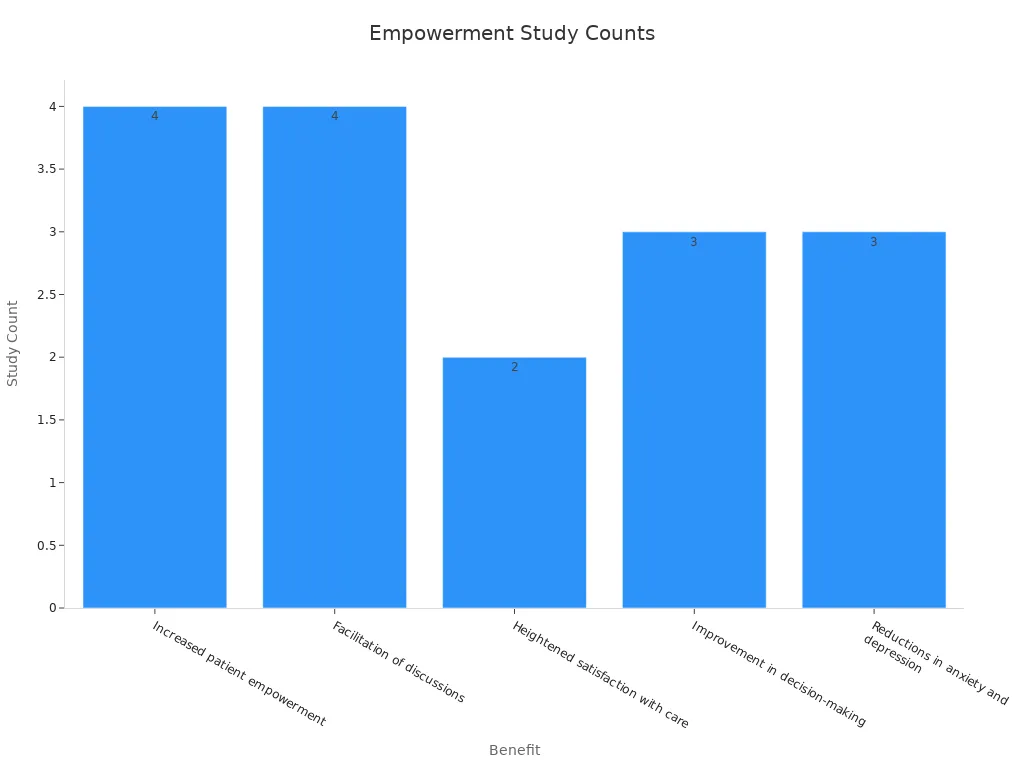How to Support a Loved One with Cancer While Honoring Their Independence

Supporting a loved one with cancer is a delicate balance. You want to be there for them, but it’s just as important to respect their independence. It’s not always easy to know how much help to offer without overstepping. Did you know that 65% of oncologists with caregiving responsibilities reported burnout in 2023? This highlights how emotional support, when paired with autonomy, can reduce stress for everyone involved. By encouraging independence: empowering your loved one with cancer, you show them that they’re still in control of their life while offering the care they need.
Key Takeaways
Listen without judging. This can reduce worry and loneliness.
Ask before helping. Let them share what they need.
Use open questions to start meaningful talks. This builds trust.
Celebrate little victories. Praise their efforts to lift their spirits.
Take care of yourself too. Staying healthy helps you support them better.
Understand Emotional and Psychological Needs
Supporting a loved one with cancer goes beyond physical care. Their emotional and psychological well-being is just as important. By understanding their needs, you can create a safe space where they feel heard, valued, and supported.
Listen Without Judgment
Sometimes, the best thing you can do is simply listen. Let your loved one share their thoughts and feelings without fear of being judged. This act alone can ease their stress and help them feel less isolated.
Anxiety in women with breast cancer often leads to fatigue and worsens treatment outcomes. It can even affect their nervous, endocrine, and immune systems. Listening without judgment can reduce this anxiety and improve their overall health.
Mindfulness practices, like active listening, have been shown to lower stress, anxiety, and depression in cancer patients. They also improve mental well-being and quality of life.
When you listen, focus on their words. Avoid interrupting or offering solutions unless they ask for advice. Sometimes, they just need someone to be present.
Validate Their Feelings
Cancer can bring a whirlwind of emotions—fear, anger, sadness, and even guilt. Let your loved one know it’s okay to feel this way. Validating their emotions shows that you understand and accept what they’re going through.
You might say things like:
“It’s okay to feel scared. This is a lot to handle.”
“I can see why you’d feel frustrated. That makes sense.”
A systematic review of 69,000 participants found that caregiver emotional support significantly reduced distress, anxiety, and depression in cancer survivors. By validating their feelings, you’re contributing to their emotional healing.
Study Type | Sample Size | Key Findings |
|---|---|---|
Systematic Review | 69,000 | Caregiver emotional support linked to reduced distress, anxiety, and depression in cancer survivors. |
Be Patient with Emotional Ups and Downs
Cancer is a rollercoaster, and emotions can change daily—or even hourly. One moment, your loved one might feel hopeful. The next, they could feel overwhelmed. Patience is key.
Mindfulness-based interventions have proven effective in reducing stress, depression, and anxiety, especially among breast cancer patients. These practices can help you stay calm and supportive during emotional highs and lows.
When they’re having a tough day, remind yourself that it’s not about you. Their emotions are a natural response to their situation. Offer a comforting presence and let them know you’re there, no matter what.
Tip: If you’re feeling overwhelmed by their emotional ups and downs, take a moment to breathe. Supporting someone with cancer is challenging, and it’s okay to acknowledge your own feelings too.
Offer Practical Support Mindfully

Practical support can make a huge difference for your loved one, but it’s important to approach it thoughtfully. You want to help without making them feel like they’ve lost control. Here’s how you can offer meaningful assistance while respecting their independence.
Ask Before Offering Help
It’s tempting to jump in and start helping, but asking first shows respect. A simple “How can I support you today?” gives them the chance to express what they truly need. Sometimes, they might want help with errands or meals. Other times, they may prefer to handle things on their own.
Research highlights that family and friends are often the most significant sources of support for cancer patients. By asking before offering help, you ensure your efforts align with their needs. This approach also reduces the risk of caregiver burnout, as you’re not taking on unnecessary tasks.
Tip: If they’re unsure what they need, suggest a few options. For example, “Would it help if I picked up groceries or drove you to your appointment?”
Provide Specific Assistance
General offers like “Let me know if you need anything” can feel overwhelming. Instead, offer specific help. For instance, you could say, “I’ll bring dinner on Tuesday” or “I can take care of the laundry this weekend.” This makes it easier for them to accept your support.
Mindfulness-based practices have been shown to improve the quality of life for cancer patients. When you provide specific, thoughtful assistance, you help reduce their stress and create a sense of stability. It’s a small way to make a big impact.
Mindfulness interventions reduce anxiety (SMD = -0.81) and depression (SMD = -0.86) in cancer patients.
They also enhance emotional regulation and acceptance, which can improve overall well-being.
Respect Their Medical Decisions
Your loved one may face tough choices about their treatment. It’s important to respect their decisions, even if you don’t fully agree. Offer your support by listening and being there for them, rather than trying to influence their choices.
A scoping review found that unmet needs and caregiver burden are closely linked. By respecting their autonomy, you help reduce stress for both of you. Remember, their journey is unique, and they need to feel in control of their care.
Note: If they ask for your opinion, share it gently and without pressure. Let them know you’ll stand by them no matter what they decide.
Communicate Thoughtfully
Communication plays a vital role when supporting a loved one with cancer. Thoughtful conversations can help them feel understood and valued. Here’s how you can approach communication in a way that fosters connection and respect.
Use Open-Ended Questions
Open-ended questions encourage your loved one to share their thoughts and feelings freely. Instead of asking, “Are you okay?” try something like, “What’s been on your mind today?” This approach invites deeper conversations and helps you understand their needs better.
Open communication helps cancer patients cope with their illness.
It empowers them with information, promoting autonomy and adaptation.
Conversations with empathy reduce stress and anxiety.
A supportive dialogue creates a safe space for emotional expression.
By asking open-ended questions, you show that you’re genuinely interested in their perspective. It’s a simple yet powerful way to strengthen your bond.
Avoid Toxic Positivity
While it’s natural to want to uplift your loved one, overly positive statements like “Stay strong” or “Everything will be fine” can sometimes do more harm than good. This is known as toxic positivity. It dismisses their valid emotions and may make them feel pressured to hide their struggles.
Research shows that suppressing negative emotions can harm mental health, especially for those facing serious illnesses like cancer. Instead of brushing off their feelings, acknowledge them. You might say, “I can see this is really hard for you. I’m here to listen.”
Encourage them to express their emotions openly.
Remind them it’s okay to feel sad, angry, or scared.
Offer support without minimizing their experience.
By avoiding toxic positivity, you create an environment where they feel safe to be themselves.
Share Your Feelings Without Overburdening Them
It’s okay to share your emotions, but be mindful not to overwhelm your loved one. They’re already dealing with a lot, so keep your feelings brief and focused. For example, you could say, “I’ve been thinking about you a lot and want to make sure you’re okay.” This shows care without adding to their stress.
If you’re feeling overwhelmed, consider talking to a friend or joining a support group. Taking care of your emotional well-being ensures you can continue to provide meaningful support. Remember, communication is a two-way street. When you share thoughtfully, you build trust and deepen your connection.
Encouraging Independence: Empowering Your Loved One with cancer

When someone you care about is battling cancer, it’s easy to want to step in and take over. But encouraging independence: empowering your loved one with cancer can help them feel more in control of their life. By respecting their choices and celebrating their efforts, you can support them in a way that honors their autonomy.
Respect Their Routine and Activities
Routines can provide a sense of normalcy during a time when everything feels uncertain. If your loved one has a daily schedule or favorite activities, try to respect those as much as possible. Whether it’s a morning walk, reading a book, or watching their favorite show, these small routines can bring comfort.
You can also encourage them to continue hobbies they enjoy. For example, if they love gardening, offer to help with heavy lifting while letting them tend to the plants. This way, you’re supporting them without taking over. Remember, maintaining their routine isn’t just about physical activities—it’s about preserving their sense of self.
Tip: If they’re too tired to stick to their usual routine, suggest alternatives. A shorter walk or a lighter version of their favorite activity can still bring joy without overwhelming them.
Empower Decision-Making
Making decisions, even small ones, can help your loved one feel empowered. Whether it’s choosing what to eat for dinner or deciding on a treatment plan, involving them in decisions reinforces their independence.
Studies show that empowering cancer patients in decision-making leads to better outcomes. For example, research highlights benefits like increased patient empowerment, improved satisfaction with care, and reduced anxiety. Here’s a quick look at some findings:
Benefit | Study References |
|---|---|
Increased patient empowerment | Elwyn et al., 2015; Grande et al., 2017; Hyatt et al., 2020; Smith et al., 2022 |
Facilitation of discussions | Dommershuijsen et al., 2019; Hyatt et al., 2020; Kwon et al., 2021; Petric et al., 2021 |
Heightened satisfaction with care | Pitkethly et al., 2008; Dommershuijsen et al., 2019 |
Improvement in decision-making | Dommershuijsen et al., 2019; Kwon et al., 2021; Smith et al., 2022 |
Reductions in anxiety and depression | Tsulukidze et al., 2014; Rieger et al., 2018; Smith et al., 2022 |

When you empower your loved one to make decisions, you’re not just helping them feel in control—you’re also strengthening your relationship. Ask for their input and respect their choices, even if they differ from what you might choose.
Celebrate Small Wins
Every step forward, no matter how small, deserves recognition. Whether it’s completing a treatment session, eating a healthy meal, or simply having a good day, celebrating these moments can boost their morale.
You don’t need to throw a party to celebrate. A simple “I’m proud of you” or a small gesture like their favorite snack can make a big difference. These celebrations remind them of their strength and resilience.
Callout: Did you know that celebrating small wins can improve mental health? It reinforces positive emotions and helps build momentum for future challenges.
Encouraging independence: empowering your loved one with cancer doesn’t mean ignoring their struggles. It means acknowledging their efforts and showing them that every step counts. By celebrating their wins, you’re helping them focus on the positives and stay motivated.
Care for Yourself as a Caregiver
Caring for someone with cancer can be emotionally and physically draining. To provide the best support, you need to take care of yourself too. Here’s how you can prioritize your well-being while being there for your loved one.
Prioritize Self-Care
You can’t pour from an empty cup. Taking time for yourself isn’t selfish—it’s essential. Whether it’s a short walk, reading a book, or practicing mindfulness, small acts of self-care can recharge your energy.
Research highlights the importance of self-care strategies for caregivers. For example:
Study | Findings |
|---|---|
Cheng et al. (2022) | Psychoeducational interventions reduce anxiety, depression, and caregiving burden. |
Gabriel et al. (2020) | Educational programs improve quality of life for caregivers and patients. |
Tan et al. (2018) | Brief psychoeducation enhances caregivers’ quality of life. |
Hemmati Maslakpak et al. (2019) | Psychoeducation reduces caregiving burden significantly. |
Çalık et al. (2022) | Quality of life improves for both patients and caregivers with proper support. |
Even 15 minutes of daily self-care can make a difference. Try journaling, meditating, or simply enjoying a quiet moment with your favorite drink.
Tip: Schedule self-care like an appointment. Treat it as non-negotiable time for yourself.
Seek Support Networks
You don’t have to do this alone. Lean on friends, family, or support groups. Talking to others who understand your experience can provide comfort and practical advice.
Many communities offer caregiver support groups, both in-person and online. These spaces allow you to share your feelings, learn coping strategies, and feel less isolated. If you’re unsure where to start, ask your loved one’s healthcare team for recommendations.
Callout: Did you know? Support networks not only reduce stress but also improve your ability to care for your loved one.
Set Boundaries to Prevent Burnout
It’s easy to overextend yourself when caring for someone you love. But setting boundaries protects your mental and physical health. Be clear about what you can and cannot do. For example, if you’re feeling overwhelmed, it’s okay to say, “I need a break today.”
Burnout can sneak up on you, so watch for signs like constant fatigue, irritability, or feeling detached. Taking breaks and asking for help when needed can prevent this. Remember, you’re not failing your loved one by setting limits—you’re ensuring you can continue to support them in the long run.
Reminder: Saying “no” sometimes allows you to say “yes” to what truly matters.
By prioritizing self-care, seeking support, and setting boundaries, you’ll not only protect your well-being but also become a stronger caregiver. Taking care of yourself is one of the best ways to care for your loved one.
Supporting a loved one with cancer is about finding the right balance. You want to be there for them, but you also need to honor their independence. This balance helps them feel empowered while ensuring they have the care they need.
Emotional support matters. Listening, validating feelings, and being patient can create a safe space for your loved one.
Practical help, when offered thoughtfully, reduces stress and preserves their autonomy.
Thoughtful communication builds trust and strengthens your connection.
Older adults often face disruptions in their daily lives after hospital stays. Adapting to these changes requires support while preserving their independence. When they can envision a future that feels familiar, it signals progress and well-being.
Remember to care for yourself too. Taking breaks, setting boundaries, and seeking support networks keep you strong. By balancing care with respect for independence, you’re not just helping your loved one—you’re empowering them to live their life fully.
Callout: Every small step forward is worth celebrating. Hope and resilience can shine even in the toughest times.
FAQ
What’s the best way to offer emotional support to someone with cancer?
The best way is to listen without judgment. Let them share their feelings openly. Avoid offering solutions unless they ask. A simple “I’m here for you” can mean a lot. Be patient with their emotional ups and downs, and remind them it’s okay to feel however they do.
How can I help without making my loved one feel dependent?
Ask before offering help. Instead of saying, “Let me know if you need anything,” suggest specific tasks like cooking dinner or running errands. Respect their routine and decisions. Small gestures that preserve their independence, like assisting with heavy lifting during hobbies, can make a big difference.
How do I avoid caregiver burnout?
Prioritize self-care. Take breaks, even if it’s just 15 minutes to relax. Join a support group to share your experiences and learn from others. Set boundaries by being clear about what you can handle. Remember, taking care of yourself helps you care for your loved one better.
Tip: Schedule self-care like an appointment—it’s non-negotiable!
Should I always stay positive around my loved one?
No, avoid toxic positivity. Saying things like “Stay strong” or “Everything will be fine” can dismiss their feelings. Instead, acknowledge their emotions. For example, say, “I know this is hard, and I’m here for you.” This creates a safe space for them to express themselves.
How can I encourage my loved one to stay involved in decision-making?
Empower them by asking for their input on both small and big decisions. Whether it’s choosing a meal or discussing treatment options, involve them in the process. Respect their choices, even if they differ from yours. This helps them feel in control and valued.
Callout: Empowering decision-making improves satisfaction and reduces anxiety for cancer patients.
See Also
Exploring Symptoms And Treatment Options For Choroid Plexus Carcinoma
Recognizing Symptoms And Treatment Approaches For Duodenal Cancer
Identifying Inflammatory Breast Cancer And Its Key Symptoms

